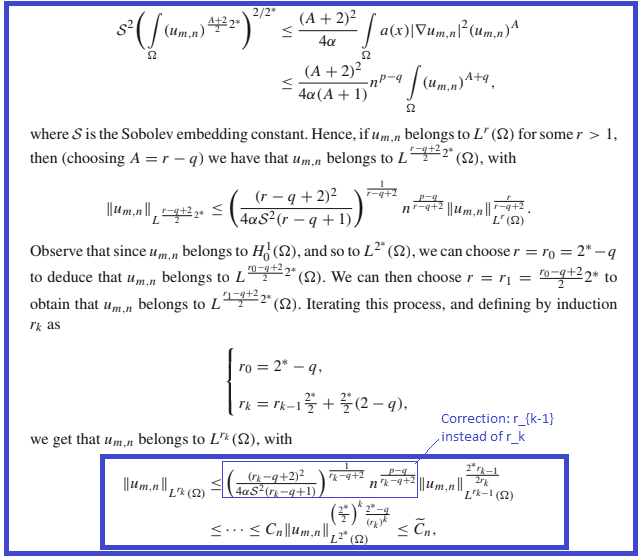I'm studying a paper, which I'll include a small piece here. And I'm struggling to calculate
$$C_n\|u_{m,n}\|^{\left(\frac{2*}{2}\right)^k\frac{2*-q}{(r_k)^k}}_{L^{2*}(\Omega)}$$
I tried to use Moser iteration. However, I do not understand where I'm making mistakes. I found the expression in (5) which is clearly different. Would you check if the expression in (6) is right?
I bet there is a very big problem, because since the basis $\left(\frac{(r_{k-1}-q+2)^2}{4\alpha S^2 (r_{k-1}-q+1)}\right)$ goes to infinity (by (4)), how can the whole expression obtained in (5) be smaller or equal to $\tilde{C}_n$?

I've included the original paper in the link of google drive below. This part is on page 165 of the paper.
MY ATTEMPT
First of all, notice that $r_0$ must be $2^*$ instead of $2^*-q$. Indeed, from page 160 of the paper one has that $q\in(1, 2^*)$ and from the beginning of the proof of the theorem 2.1 (page 162 in step 1), one has that $\gamma +2<q<\text{max}(p,2^*)$, which implies that $q\in (2, 2^*)$. Then, if $r_0=2^*-q$ and $r_1=\frac{2^*}{2}r_0+\frac{2^*}{2}(2-q)$ then $\left(\frac{2^*}{2}\right)(r_0+2-q)> (r_0+2-q)$ since $\left(\frac{2^*}{2}\right)>1$. However, $(r_0+2-q)>r_0 \iff 2-q> 0\iff q<2$. Contradicting the fact that $q\in (2, 2^*)$.
Now, let's see the iteration
\begin{equation} |u_{m,n}|_{L^{\frac{r-q+2}{2}2^*}(\Omega)}\leq \left(\frac{(r-q+2)^2}{4\alpha S^2 (r-q+1)}\right)^{\frac{1}{r-q+2}}n^{\frac{p-q}{r-q+2}}|u_{m,n}|_{L^r(\Omega)}^{\frac{r}{r-q+2}}\tag1 \end{equation}
Defining $r_0=2^*$ and $r_k=\left(\frac{2^*}{2}r_{k-1}+\frac{2^*}{(2-q)}\right)$. From (1) one has that
\begin{align*} &|u_{m,n}|_{L^{r_k}(\Omega)}=|u_{m,n}|_{L^{\frac{(r_{k-1}-q+2)}{2}2^*}(\Omega)}\tag2\\ &\leq\underbrace{\left(\frac{(r_{k-1}-q+2)^2}{4\alpha S^2 (r_{k-1}-q+1)}\right)^{\frac{1}{r_{k-1}-q+2}}n^{\frac{p-q}{r_{k-1}-q+2}}}_{C_1}|u_{m,n}|_{L^{r_{k-1}}(\Omega)}^{\left(\frac{2^*}{2}\right)\frac{r_{k-1}}{r_k}}\\ &=C_1|u_{m,n}|_{L^{r_{k-1}}(\Omega)}^{\left(\frac{2^*}{2}\right)\frac{r_{k-1}}{r_k}}\\ &\leq C_1\left\{\left(\frac{(r_{k-2}-q+2)^2}{4\alpha S^2 (r_{k-2}-q+1)}\right)^{\frac{1}{r_{k-2}-q+2}}n^{\frac{p-q}{r_{k-2}-q+2}}|u_{m,n}|_{L^{r_{k-2}}(\Omega)}^{\left(\frac{2^*}{2}\right)\frac{r_{k-2}}{r_{k-1}}}\right\}^{\left(\frac{2^*}{2}\right)\frac{r_{k-1}}{r_k}}\\ &\leq C_1\underbrace{\left(\frac{(r_{k-2}-q+2)^2}{4\alpha S^2 (r_{k-2}-q+1)}\right)^{\frac{1}{r_{k-2}-q+2}\left(\frac{2^*}{2}\right)\frac{r_{k-1}}{r_k}}n^{\frac{p-q}{r_{k-2}-q+2}\left(\frac{2^*}{2}\right)\frac{r_{k-1}}{r_k}}}_{C_2}|u_{m,n}|_{L^{r_{k-2}}(\Omega)}^{\left(\frac{2^*}{2}\right)^2\frac{r_{k-2}}{r_{k-1}}\frac{r_{k-1}}{r_k}}\\ &=C_1C_2|u_{m,n}|_{L^{r_{k-2}}(\Omega)}^{\left(\frac{2^*}{2}\right)^2\frac{r_{k-2}}{r_k}}\\ &\leq C_1C_2\left\{\left(\frac{(r_{k-3}-q+2)^2}{4\alpha S^2(r_{k-3}-q+2)}\right)^{\frac{1}{r_{k-3}-q+2}}n^{\frac{p-q}{r_{k-3}-q+2}}|u_{m,n}|_{L^{r_{k-3}}(\Omega)}^{\frac{2^*}{2}\frac{r_{k-3}}{r_{k-2}}}\right\}^{\left(\frac{2^*}{2}\right)^2\frac{r_{k-2}}{r_k}}\\ &= C_1C_2\underbrace{\left(\frac{(r_{k-3}-q+2)^2}{4\alpha S^2(r_{k-3}-q+2)}\right)^{\frac{1}{r_{k-3}-q+2}\left(\frac{2^*}{2}\right)^2\frac{r_{k-2}}{r_k}}n^{\frac{p-q}{r_{k-3}-q+2}\left(\frac{2^*}{2}\right)^2\frac{r_{k-2}}{r_k}}}_{C_3}|u_{m,n}|_{L^{r_{k-3}}(\Omega)}^{\left(\frac{2^*}{2}\right)^3\frac{r_{k-3}}{r_{k-2}}\frac{r_{k-2}}{r_k}}\\ &= C_1C_2C_3|u_{m,n}|_{L^{r_{k-3}}(\Omega)}^{\left(\frac{2^*}{2}\right)^3\frac{r_{k-3}}{r_k}}\\ &\leq \cdots \leq\\ &\leq C_1C_2C_3\cdots C_{k-1}\underbrace{\left(\frac{(r_{0}-q+2)^2}{4\alpha S^2(r_{0}-q+2)}\right)^{\frac{1}{r_{0}-q+2}\left(\frac{2^*}{2}\right)^{k-1}\frac{r_1}{r_k}}n^{\frac{p-q}{r_{0}-q+2}\left(\frac{2^*}{2}\right)^{k-1}\frac{r_1}{r_k}}}_{C_k}|u_{m,n}|_{{L^{2^*}}(\Omega)}^{\left(\frac{2^*}{2}\right)^{k}\frac{r_0}{r_k}} \end{align*}
Now rewriting the first powers in $C_1, C_2, ..., C_k$, it follows that in
- item $C_1)$ \begin{align*} \frac{1}{r_{k-1}-q+2}&=\frac{\left(\frac{2^*}{2}\right)}{\left(\frac{2^*}{2}\right)(r_{k-1}-q+2)}\\ &=\left(\frac{2^*}{2}\right)\frac{1}{r_k} \end{align*}
- item $C_2)$ \begin{align*} \frac{1}{r_{k-2}-q+2}\left(\frac{2^*}{2}\right)\frac{r_{k-1}}{r_k}&=\frac{\left(\frac{2^*}{2}\right)}{\left(\frac{2^*}{2}\right)(r_{k-2}-q+2)}\left(\frac{2^*}{2}\right)\frac{r_{k-1}}{r_k}\\ &=\left(\frac{2^*}{2}\right)^2\frac{1}{r_{k-1}}\frac{r_{k-1}}{r_k}\\ &=\left(\frac{2^*}{2}\right)^2\frac{1}{r_k}\\ \end{align*}
- item $C_3)$ \begin{align*} \frac{1}{r_{k-3}-q+2}\left(\frac{2^*}{2}\right)^2\frac{r_{k-2}}{r_k}&=\frac{\left(\frac{2^*}{2}\right)}{\left(\frac{2^*}{2}\right)(r_{k-3}-q+2)}\left(\frac{2^*}{2}\right)^2\frac{r_{k-2}}{r_k}\\ &=\left(\frac{2^*}{2}\right)^3\frac{1}{r_{k-2}}\frac{r_{k-2}}{r_k}\\ &=\left(\frac{2^*}{2}\right)^3\frac{1}{r_k} \end{align*} $\vdots$
- item $C_k)$ \begin{align*} \frac{1}{{r_0}-q+2}\left(\frac{2^*}{2}\right)^{k-1}\frac{r_1}{r_k}&=\frac{\left(\frac{2^*}{2}\right)}{\left(\frac{2^*}{2}\right)(r_0-q+2)}\left(\frac{2^*}{2}\right)^{k-1}\frac{r_1}{r_k}\\ &=\left(\frac{2^*}{2}\right)^k\frac{1}{r_1}\frac{r_1}{r_k}\\ &=\left(\frac{2^*}{2}\right)^k\frac{1}{r_k} \end{align*}
Replacing properly the expressions above in every power of $C_1, C_2, ..., C_k$ it follows that \begin{align*} C_1&=\left(\frac{(r_{k-1}-q+2)^2}{4\alpha S^2(r_{k-1}-q+1)}\right)^{\left(\frac{2^*}{2}\right)\frac{1}{r_k}}n^{(p-q)\left(\frac{2^*}{2}\right)\frac{1}{r_k}}\\ C_2&=\left(\frac{(r_{k-2}-q+2)^2}{4\alpha S^2(r_{k-2}-q+1)}\right)^{\left(\frac{2^*}{2}\right)^2\frac{1}{r_k}}n^{(p-q)\left(\frac{2^*}{2}\right)^2\frac{1}{r_k}}\\ &\vdots\\ C_k&=\left(\frac{(r_0-q+2)^2}{4\alpha S^2(r_0-q+1)}\right)^{\left(\frac{2^*}{2}\right)^k\frac{1}{r_k}}n^{(p-q)\left(\frac{2^*}{2}\right)^k\frac{1}{r_k}}\\ \end{align*} Rewriting the whole expression in (2) replacing the exponents as above, one has that \begin{align*} |u_{m,n}|_{L^{r_k}}&\leq \left[\left(\frac{(r_{k-1}-q+2)^2}{4\alpha S^2(r_{k-1}-q+1)}\right)n^{(p-q)}\right]^{\left(\frac{2^*}{2}\right)\frac{1}{r_k}}\\ &\cdot \left[\left(\frac{(r_{k-2}-q+2)^2}{4\alpha S^2(r_{k-2}-q+1)}\right)n^{(p-q)}\right]^{\left(\frac{2^*}{2}\right)^2\frac{1}{r_k}}\\ &\vdots\\ &\cdot\left[\left(\frac{(r_0-q+2)^2}{4\alpha S^2(r_0-q+1)}\right)n^{(p-q)}\right]^{\left(\frac{2^*}{2}\right)^k\frac{1}{r_k}}\cdot |u_{m,n}|_{L^{2^*}(\Omega)}^{\left(\frac{2^*}{2}\right)^k\frac{r_0}{r_k}}\tag3\\ \end{align*} Considering $r_0=2^*$. Since $\frac{2^*}{2}>1$, let's prove that $r_k$ is an increasing sequence which diverges to infinity.
Indeed, note that if
- item $(k=1)$ \begin{align*} r_1&=\frac{2^*}{2}(r_0-q+2)\\ &=\frac{2}{2^*}=r_0+(2-q)\\ \end{align*} Subtracting $\frac{2}{2^*}r_0$ in both sides, it follows that \begin{align*} \frac{2}{2^*}(r_1-r_0)&=r_0-\frac{2}{2^*}r_0+(2-q)\\ &=2^*-\frac{2}{2^*}2^*+2-q \\ &=2^*-q>0 \end{align*} Thus $r_1>r_0$.
- item $(k=2)$ , similarly \begin{align*} \frac{2}{2^*}(r_2-r_1)&=r_1-\frac{2}{2^*}r_1+(2-q)\\ &=\frac{2^*}{2}(r_0-q+2)-r_0+q-2-q+2\\ &=\frac{(2^*)^2-2^*q+22^*-22^*}{2}\\ &=\frac{2^*}{2}(2^*-q)>0 \end{align*} Therefore, $r_2>r_1$.
Proceeding in this way indefinitelyt, one can find that $r_k$ is an increasing sequence, that is $r_0<r_1<r_2<...<r_k<...$ and its limit is $$\lim_{k\to \infty}r_k=+\infty.$$ One claims that $$\left(\frac{(r_0-q+2)^2}{4\alpha S^2(r_0-q+1)}\right)<\left(\frac{(r_1-q+2)^2}{4\alpha S^2(r_1-q+1)}\right)<...<\left(\frac{(r_k-q+2)^2}{4\alpha S^2(r_k-q+1)}\right)<...\tag4$$ Indeed, taking $t=r_0, r_1, r_2, ..., r_k,...$ and defining $$f(t)=\frac{(t-q+2)^2}{4\alpha S^2 (t-q+1)}$$ one has that \begin{align*} f'(t)&=\frac{2(t-q+2)4\alpha S^2(t-q+1)-(t-q+2)^24\alpha S^2}{4\alpha S^2(t-q+1)^2}\\ &=\frac{(t-q+2)[2t-2q+2-t+q-2]}{(t-q+1)^2} \end{align*} In order to show that $f$ is an increasing function one only needs to get that $(t-q+2)(t-q)>0$ and this is true, first note that if $t=r_0$ then $(2^*-q+2)(2^*-q)>0$ once $2^*-q>0$. Now, by (4), replacing every single value for $t$ one has that $f'(t)>0$ which implies that $f$ is an increasing function. Hence one has proved the claim. Now turning back to (3) replacing the result in (4), one can rewrite (3) as $$|u_{m,n}|_{L^{r_k}(\Omega)}\leq \left[\left(\frac{(r_{k-1}-q+2)^2}{4\alpha S^2(r_{k-1}-q+1)}\right)n^{(p-q)}\right]^{\frac{1}{r_k}\displaystyle\sum_{i=1}^{k}\left(\frac{2^*}{2}\right)^i}|u_{m,n}|_{L^{2^*}(\Omega)}^{\left(\frac{2^*}{2}\right)^k\frac{r_0}{r_k}}.\tag5$$ On the other hand, notice that, taking $A=\left(\frac{2^*}{2}\right)(2-q)$ one can rewrite $r_k$ as \begin{align*} r_k&=r_{k-1}\left(\frac{2^*}{2}\right)+\left(\frac{2^*}{2}\right)(2-q)\\ &=r_{k-1}\left(\frac{2^*}{2}\right)+A\\ &=\left(r_{k-2}\left(\frac{2^*}{2}+A\right)\right)\left(\frac{2^*}{2}\right)+A\\ &=\left(\frac{2^*}{2}\right)^2r_{k-2}+\left(1+\frac{2^*}{2}\right)A\\ &=\left(\frac{2^*}{2}\right)^2\left[r_{k-3}\left(\frac{2^*}{2}+A\right)\right]+\left(1+\frac{2^*}{2}\right)A\\ &=\left(\frac{2^*}{2}\right)^3r_{k-3}+\left(1+\left(\frac{2^*}{2}\right)+\left(\frac{2^*}{2}\right)^2\right)A\\ &\vdots\\ &=\left(\frac{2^*}{2}\right)^kr_0+A+A\left(\frac{2^*}{2}\right)+A\left(\frac{2^*}{2}\right)^2+...+A\left(\frac{2^*}{2}\right)^{k-1} \end{align*} what is the same as $r_k=\left(\frac{2^*}{2}\right)^kr_0+A\displaystyle\sum_{i=0}^{k-1}\left(\frac{2^*}{2}\right)^i$, this is $$r_k=\left(\frac{2^*}{2}\right)^kr_0+(2-q)\left(\frac{2^*}{2}\right)\left[\frac{1-\left(\frac{2^*}{2}\right)^{k-1}}{1-\left(\frac{2^*}{2}\right)}\right].\tag6$$
I appreciate if someone can help me! Thanks in advance.
